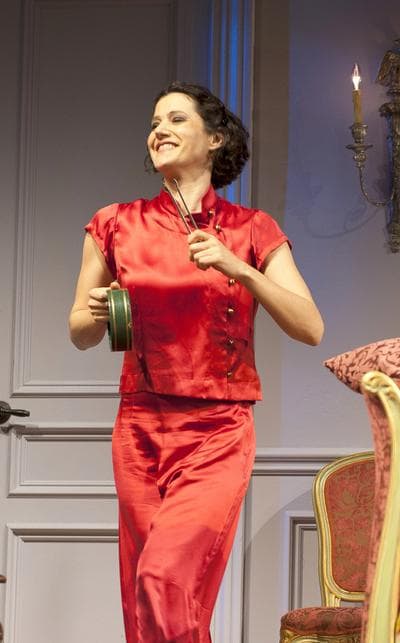Advertisement
'Private Lives' Goes Public At The Huntington
Bianca Amato, where have you been all my life?
And if you're asking, "Who's Bianca Amato?" then you haven't seen "Private Lives" at the Huntington Theatre Company, where Amato is chewing up the magnificent scenery (through June 24) as Noel Coward's feisty femme, Amanda.

This is the season closer for the Huntington, which is leaving 'em laughing with a hearty production of the Coward classic directed by Maria Aitken. She's also directed "Alfred Hitchcock's The 39 Steps" and "Educating Rita" at the Huntington, neither of which I enjoyed as much as "Private Lives." The two earlier productions seemed to work a little too hard for the laughter where this just rides Amato's coattails, or dressing gown and silk pajamas, toward the kind of seemingly spontaneous hijinx that make Coward, Coward.
But who is Noel Coward? Some years ago a couple of smart friends of mine were talking about how much they loved the TV series, "Frasier," calling it the contemporary incarnation of Coward. What they were referring to, I think, is the sophisticated banter, the casual elegance, the unapologetic elitism and the ability to deliver droll one-liners.
Fair enough, but for Edward Albee, there are three things that made Coward great, as he wrote in an introduction to Coward's plays -- "literary excellence, dramatic sure-footedness, and pertinence." The last quality is what separates Coward from "Frasier" and unites him with Albee, who went on to say about that quality, "And Mr. Coward's subjects — the ways that we kid ourselves that we do not exist with each other and with ourselves — have not ... gone out of date."
The issue of pertinence is also what gives me some pause about declaring the Huntington's production a great one. A great production of Coward's better plays ought to make you see his primary characters, Elyot and Amanda, as forerunners of Albee's George and Martha in "Who's Afraid of Virginia Woolf?" as much as of Frasier Crane and any of the secondary characters, who were pertinent to not very much in viewers' private or public lives, other than as a diversion to pass the time.
"And Mr. Coward's subjects — the ways that we kid ourselves that we do not exist with each other and with ourselves — have not ... gone out of date."
Edward Albee
But enough about "Frasier." The stumbling block here is James Waterston's Elyot. For those who don't know the story, Elyot and Amanda are former spouses who have remarried and find themselves staying in adjoining honeymoon rooms in a French hotel in Deauville. (Pertinence and believability aren't the same thing.) After re-meeting cute on their respective balconies they declare their mutual hatred for each other — and their undying love for each other — and their mutual hatred, etc.
Waterston is fine in his putdowns of life and love, evoking a starchy Ralph Fiennes, but his over-arch delivery seems as dated as dressing for dinner. I much preferred Michael Hammond's more contemporary (Albee-esque?) Elyot from the Lyric Stage production of about eight years ago. He actually seemed to be Amanda's equal instead of her straight man.
The Lyric's Amanda was played by the wonderful local actress Paula Plum who appears briefly in the Huntington production as Amanda's and Elyot's non-English speaking maid, Louise. As good as she was as Amanda no one could begrudge the Huntington for casting Amato this time around. Aitken herself, incidentally, played Amanda in the West End in 1980, but all great performances transcend comparison and Amato's is a great performance, whether vamping to a record, putting Elyot in his place with her prefeminist wit and wile, or merely gaping at the idiocy around her (when not contributing to it).
The poor spouses left behind, Sibyl and Victor, are perfectly good in their befuddlement as portrayed by Autumn Hurlbert and Jeremy Webb. But it's Amato's Amanda who suggests there's something beyond one-liners at work in Coward's cosmos, something that would make her as at home in Julian Barnes's recent Booker prize-winning "The Sense of an Ending" or F/X's "Justified." Or in Albee's "Who's Afraid of Virginia Woolf?"
If a comic character can be a femme fatale then Amanda is as fatale as they come. Elyot knows, as do we, that life would be a lot less aggravating with second wife Sibyl, but passion rules the day. The same is true, in reverse, for Amanda, of course, but Coward is smart enough to not only leave us laughing, but leave us guessing about what the future private lives of all these characters are going to be.
This program aired on June 7, 2012. The audio for this program is not available.

